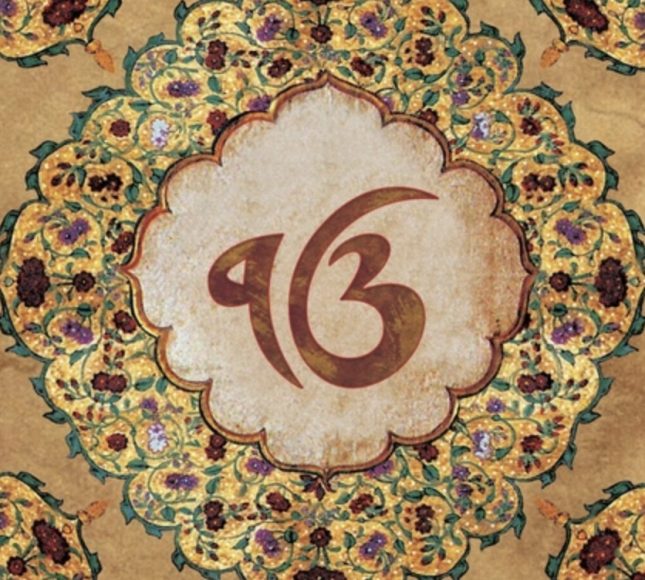DINRAIN, lit. (din + rain) day and night, is the title (dinraini) of a single 4stanza hymn by Guru Arjan Dev in the Majh measure (GG, 13637). The composition evidently follows the prosodic vogue of inscribing verses to kalkrama (process of time) embracing forms such as baramaha (twelve months of the year), thitf (lunardates) and var (days of the week). Otherwise, the contents of this hymn are in harmony with the tenor of the entire text, i.e. praise of, surrender to, and love of God, the Ultimate Reality. Writing in the first person and in conversational style mixed with soliloquy. Guru Arjan expresses the soul`s yearning for reunion with the Lord and, besides panegyrizing the Timeless, Merciful, True Creator. He also gives homage to those who day and night remember and serve Him. dinu rainiji prabh kauri sevade tin kai ad balihar I am a hundred times sacrifice unto those who serve the Lord day and night; inu rainijisu na visarai so haria hovai jantu He who does not forget Him during day or night remains evergreen; sarab kaliana titu dini hari pars! gur ke pau The day during which one worships at he feet of Godguru brings total liberation.Besides using dinrain as the title of this hymn, the term frequently appears in gurbani impressing upon the devotees the need and significance of remembering the Name (nam) constantly during day and night. Other variations on the term are rainidinasu, dinrati, nisidinu, ratdinant and plain dinu ar rati. M.G.S.
References :
1. ull
DINRAIN: The Hymn of Day and Night Devotion in Sikhism, a short yet profound composition by Guru Arjan Dev that encapsulates the essence of constant remembrance (Naam Simran) of the Divine.
Overview and Title Significance
DINRAIN—a compound derived from “din” (day) and “rain” (night)—literally signifies “day and night.” This hymn, often called a dinraini, is composed in the Majh musical measure and is found in the Guru Granth Sahib (page 136-37). With just four stanzas, it reflects the classical prosodic vogue of inscribing verses in harmony with the courses of time—akin to the twelve months (baramaha), lunar dates (thitf), and days of the week (var). The title itself underscores the call for round-the-clock remembrance and devotion to the Divine.
Historical and Liturgical Context
- Authorship and Composition:
Composed by Guru Arjan Dev, the hymn was designed to resonate with a community deeply engaged in both inward spiritual reflection and outward communal practice. Guru Arjan’s choice of the Majh measure lends the hymn a measured, reflective cadence that is both meditative and uplifting. - Function in Devotional Practice:
In Sikh devotional life, the emphasis on day and night remembrance is paramount. DINRAIN stands as a succinct reminder that constant meditation on the Name (Nam) is the gateway to spiritual liberation. It urges devotees to integrate the divine presence into every moment of life, thus dissolving the barriers that separate the mundane from the sacred.
Literary Features and Poetic Qualities
- Structure and Style:
DINRAIN is structured into four stanzas written in a conversational, first-person style that sometimes resembles a soliloquy. This intimate tone serves to express the soul’s profound yearning for union with the Almighty while simultaneously extolling the virtues of unwavering devotion. - Language and Imagery:
The hymn’s language is both accessible and richly evocative. It employs vivid imagery to portray the timeless beauty and mercy of the Creator. Phrases within the hymn highlight that those who “remember Him during day or night” remain evergreen—an assertion that the perpetual presence of the Divine nurtures spiritual life and growth. - Rhythm of Time:
While the hymn’s form reflects elements such as the passage of days and nights, it also symbolically unifies the cyclic nature of time with the eternal nature of the Divine. This duality reinforces the core Sikh idea that while human life is transient, the remembrance of God is both timeless and transformative. Central Themes and Devotional Message - Constant Remembrance (Nam Simran):
DINRAIN is a vivid call to remember and serve the Lord without interruption. Its lines evoke the concept that true liberation (mukti) is attainable only when one remains constantly immersed in the divine presence. The recurring reminder that the devotee should dedicate every moment—day and night—to the Divine is both a personal and communal exhortation. - Devotional Sacrifice:
The hymn includes expressions of self-offering and humility, suggesting that one should be willing to offer oneself repeatedly in the service of the Divine. This sacrificial attitude is emblematic of the broader Sikh ethos where personal ego is dissolved in the overwhelming grace of God. - Integration of Temporal and Transcendent:
By invoking the structure of time (through allusions to days, months, and lunations), DINRAIN warns against the distractions of the world. It asserts that keeping focus on the Supreme is not confined by temporal boundaries—whether day or night, the divine call remains constant. Contemporary Relevance - Daily Devotional Practice:
Today, DINRAIN continues to be recited in Gurdwaras and during personal meditation sessions. Its succinct yet powerful message reinforces the importance of integrating spiritual practice into the rhythm of everyday life. - Spiritual Inspiration:
For modern devotees seeking balance in an often hectic world, this hymn offers solace—a reminder that true peace and spiritual rejuvenation arise from the constant remembrance of the Creator. Its exhortation to abandon distraction and focus on the divine remains as relevant now as it was in the time of Guru Arjan Dev. Concluding Insights
DINRAIN is more than just a hymn; it is a poetic encapsulation of the Sikh ideal of continuous remembrance. By urging devotion both day and night, Guru Arjan Dev creates a timeless reminder that the path to liberation lies in persistent, heartfelt engagement with the Divine. This short composition, with its lyrical beauty and profound message, continues to inspire and guide devotees toward a life of inner tranquility and absolute surrender to God.



